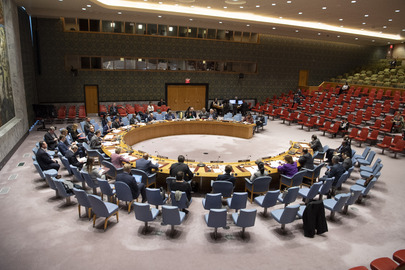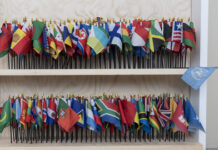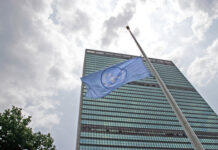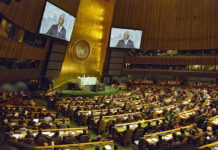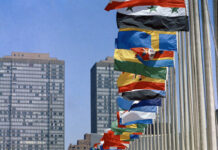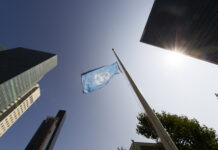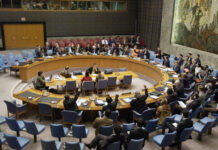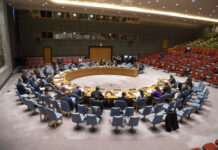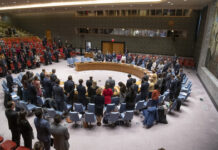This is the News in Brief from the United Nations.
War crimes fears over Israeli ground invasion of Rafah
Any move by Israel to extend its full-scale invasion of Gaza into the massively overcrowded southern city of Rafah could lead to war crimes which must be prevented at all costs, the UN aid coordination office, OCHA, said on Tuesday.
In Geneva, here’s OCHA spokesperson Jens Laerke:
“We as the UN and Member States of the UN can bear witness. We can warn what might unfold with a ground invasion and we can make clear what the law says… under international humanitarian law, indiscriminate bombing of densely populated areas may amount to war crimes.”
The development came as OCHA reported an increase in shelling in Rafah governorate. At the same time, thousands of Gazans have continued to flood into Rafah, including many uprooted by intense fighting in Khan Younis.
Rafah’s population has increased fivefold as result of this exodus since war erupted in the enclave on 7 October, in response to Hamas-led terror attacks in Israel that left some 1,200 dead and more than 250 captured as hostages.
Meanwhile, UN partner the International Federation of Red Cross and Red Crescent Societies (IFRC) reported that 8,000 Gazans who had been sheltering at Al Amal hospital in Khan Younis had left the facility on Monday.
Despite this positive development, the IFRC warned that the situation in Gaza was “beyond catastrophic” and “a nightmare” that continues to get worse.
Thousands still struggling one year on from Syria-Turkïye earthquakes
Thousands of people are still homeless and traumatised a year on from the earthquake disaster a year ago in Turkïye and Syria that killed more than 55,000 people.
The UN’s emergency relief chief, Martin Griffiths, said on Tuesday that more than 43,000 people in Syria’s northwest still haven’t returned home and they now live in reception centres or displacement camps.
A staggering 16.7 million people inside Syria need humanitarian assistance today, Mr. Griffiths noted, which is the highest number since war erupted almost 13 years ago.
Echoing those concerns, the UN refugee agency, UNHCR, said that the disaster continues to affect host communities and Syrian refugees in Türkiye which hosts 3.4 million refugees.
Here’s UNHCR spokesperson Shabia Mantoo speaking in Geneva:
“Ninety per cent of refugees in the country were already unable to cover basic needs prior to the earthquakes, with many reliant on informal employment, social assistance or loans. Now, in the aftermath, critical needs have intensified around housing, basic utilities, shelter, electricity, health care and telecommunications.”
In Türkiye, UNHCR has provided over three million relief items at the request of the Government, including tents, containers, hygiene kits, bedding and warm clothing for people living in temporary accommodation centres.
The UN refugee agency has also supported protection activities for more than 500,000 people, including legal counselling and formal identification, referrals for psychosocial support and cash assistance.
UN health agency responds to unprecedented cholera spike in Africa
Cholera cases are surging globally and there’s been an unprecedented spike in in Africa, the World Health Organization (WHO) said on Tuesday.
Dr. Fiona Braka from WHO’s regional office in Brazzaville, Congo, said that the eastern and southern African regions have been particularly badly affected.
In just the first four weeks of the year, 10 African countries reported more than 26,000 cases and 700 deaths, which is nearly double the number reported last year over the same period.
Zambia and Zimbabwe have been worst-hit, but Mozambique, Tanzania, the Democratic Republic of the Congo, Ethiopia and Nigeria are also in the grip of “active outbreaks”, with a high risk of further spread, Dr. Braka said.
“This year, Zambia is seeing its worst cholera outbreak. Zimbabwe is seeing its second worse outbreak. Last year it was Malawi and Mozambique. We will continue to see records being broken as long as people do not have access to clean water and sanitation facilities.”
Increased flooding associated with climate change has helped the spread of cholera, which is a preventable waterborne disease. More cyclones and droughts have also reduced access to clean water, creating an ideal environment for cholera to thrive.
Despite a global shortage of oral cholera vaccines, WHO supports inoculation drives in Zambia where over 1.7 million people have been vaccinated. A campaign is also underway in Zimbabwe which expects to provide protection to 2.3 million people.
Source of original article: United Nations (news.un.org). Photo credit: UN. The content of this article does not necessarily reflect the views or opinion of Global Diaspora News (www.globaldiasporanews.com).
To submit your press release: (https://www.globaldiasporanews.com/pr).
To advertise on Global Diaspora News: (www.globaldiasporanews.com/ads).
Sign up to Global Diaspora News newsletter (https://www.globaldiasporanews.com/newsletter/) to start receiving updates and opportunities directly in your email inbox for free.


